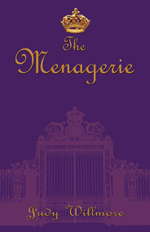Judy Willmore is a former reporter and private investigator who is now a practicing psychotherapist and astrologer. Her dream of publishing a novel came true in 2021 after years of writing and editing her first full-length fiction manuscript. Judy’s debut release, The Menagerie: Passion, Power, and Poison in the Court of the Sun King (Artemesia Publishing), is based on the Affair of the Poisons, a sensational criminal case of 17th-century France. You’ll find Judy on her website JudyWillmoreAuthor.com.
 What is it about the Affair of the Poisons that fascinated you so much you based your first novel on it?
What is it about the Affair of the Poisons that fascinated you so much you based your first novel on it?
I was intrigued by scholars arguing for years: Did King Louis XIV’s mistress try to poison him? And did she or didn’t she have a black mass celebrated over her naked body? Somehow I just couldn’t believe it.
The Menagerie is more than historical fiction. How would you characterize the book?
The book describes a mystery that has captivated historians for many years. I considered making it nonfiction in order to show exactly how it happened. However, as I got into it, I needed to show why these real people behaved the way they did, especially the heroine.
Who are your main characters, and how did you develop them?
All the characters are real people described by multiple eyewitnesses of the events, except Sylvie. Athenais, the King’s mistress, is portrayed by her contemporaries as deeply flawed, frantically trying to keep the love of the King. However, I have her also seeking redemption. Nicolas de La Reynie, Lieutenant General of Police, acted as both investigator and judge, admired by his contemporaries, hated by the noble suspects. La Reynie struggles with his ideals as he is forced to withhold information from his fellow judges. King Louis XIV is obsessed with bedding any available female, a habit that makes him the proposed victim of an assassination plot, possibly instigated by Athenais. He wants her to be investigated, but in secret.
The book begins with Sylvie Dupont as a little girl who grows into a rather feisty embroiderer who finds herself in the middle of a murder plot. I had to create a character who was not a suspect, not a noble, who could tell the story from the inside of court.
Tell us how the book came together.
Writing the book took many years. I researched as I kept writing, through getting my bachelor’s degree then Master of Science in Psychology. Then life intervened with recovering from cancer and establishing a career as a therapist. Editing it down took more years. I had tons of information and way too many pages that had to be winnowed down into the basic plot. Finally I found Lisa McCoy, my editor, who recommended Geoff Habiger of Artemesia Press. Published at last!
What decisions did you have to make about including historical figures or events in order for The Menagerie to work?
There were actual people—fascinating characters worthy of their own books—that I had to cut out. There were so many suspects among the nobility that I had to narrow it down to who was absolutely essential to the plot. At one point, the book was 640 pages. I cut 200 pages so it would be marketable.
How did you choose the title?
Versailles still has the menagerie, albeit without live animals. I found that the courtiers, especially the women, were trapped, imprisoned by their fathers, their brothers, their husbands, and their desperation led to witchcraft and poison.
Any “Oh, wow!” moments while doing research for this book?
A big moment for me was discovering how the playwright Jean Racine was right in the middle of this. He must have known Athenais’ maid (a major suspect), and he was briefly a suspect himself. Racine, however, helped provide a moral core to the book.
What was the most challenging aspect of writing The Menagerie, and what was the most rewarding?
The most challenging part of writing the book was the rewrite, cutting it down by 200 pages. That took many months and many hard decisions. The most rewarding part by far was the actual writing, creating scenes and characters.
Do you prefer the creating or editing aspect of writing? How do you feel about research?
I am a former private investigator, and I love research! But my favorite time is spent with my characters: when it flows, they are in the room with me, and I am taking dictation.
What advice do you have for beginning or discouraged writers?
Don’t give up! And try to find beta readers. I wish I had been able to find one earlier. It might have saved me a lot of time in rewrite.
What writing projects are you working on now?
I am writing a sequel about Sylvie called The Flight. She escapes Versailles’ menagerie and finds work at les Gobelins, the manufacturer of the beautiful furnishings of Versailles. Her dream job, but she is surrounded by Huguenots desperate to escape persecution.
 KL Wagoner (writing as Cate Macabe) is the author of This New Mountain: a memoir of AJ Jackson, private investigator, repossessor, and grandmother. Kathy posts to a speculative fiction blog at klwagoner.com and writes about memoir at ThisNewMountain.com.
KL Wagoner (writing as Cate Macabe) is the author of This New Mountain: a memoir of AJ Jackson, private investigator, repossessor, and grandmother. Kathy posts to a speculative fiction blog at klwagoner.com and writes about memoir at ThisNewMountain.com.



























This is really a compelling, well-written book. I loved it.
Thanks, Marcia!
Nice interview questions and great answers by the author. Thank you
Thanks! I hope you consider reading the book too.